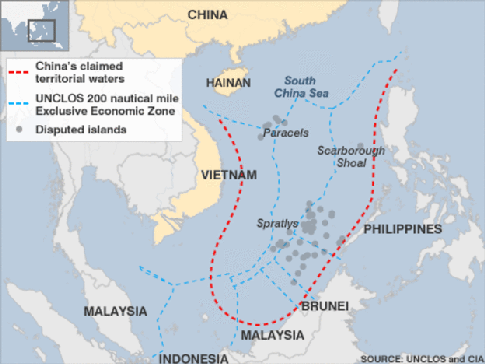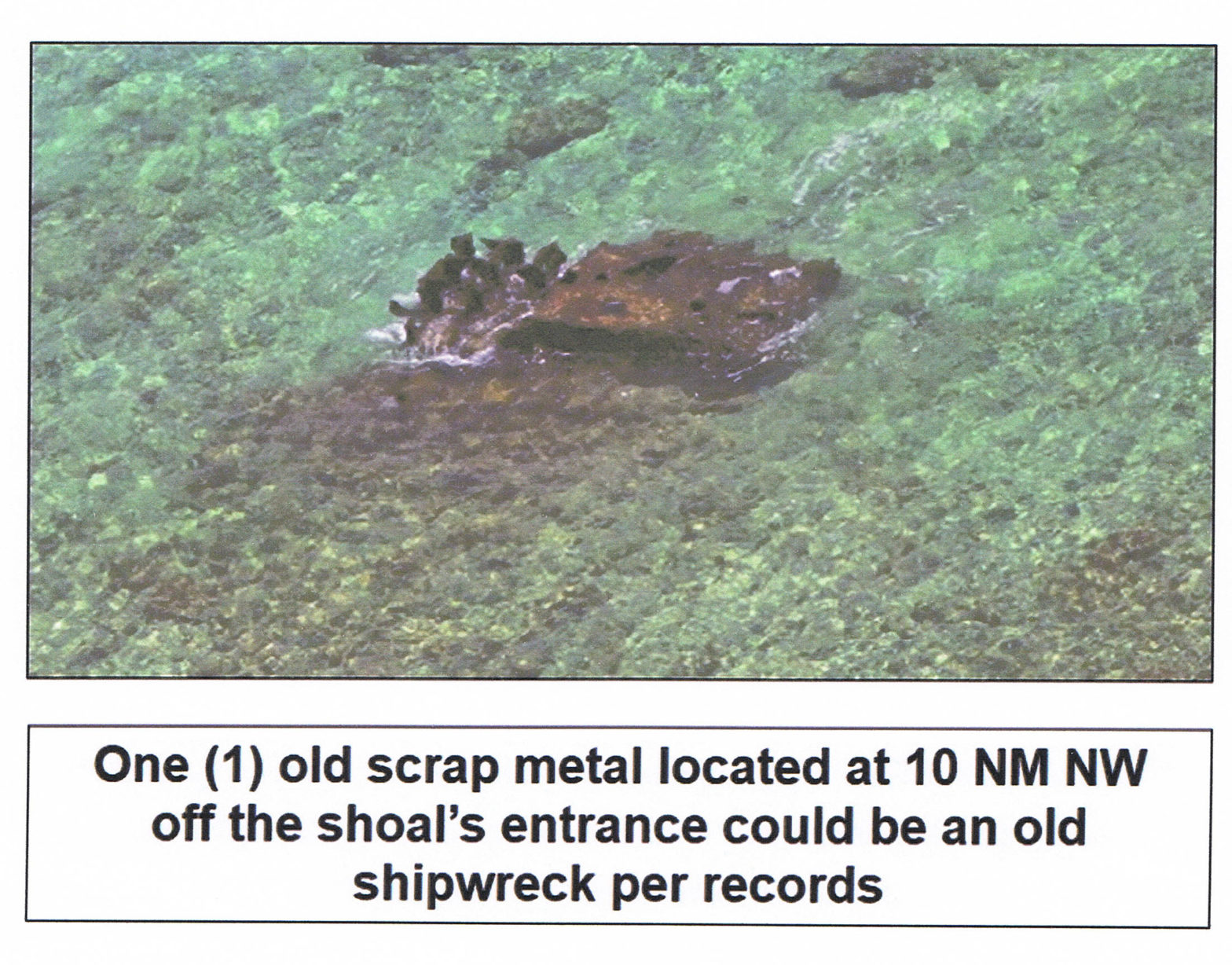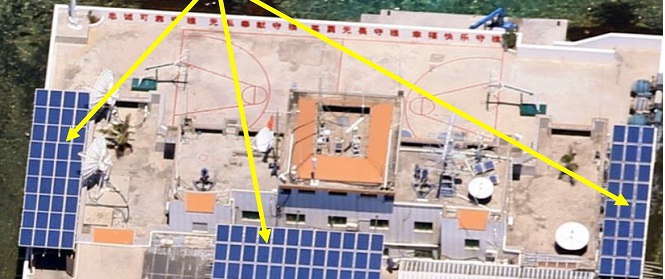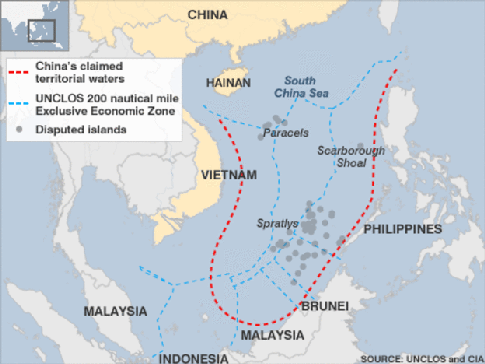
The Permanent Court of Arbitration ruled today that China’s all-encompassing nine-dash line is not valid.
(To read the 501-page Award, please go to this site : https://pca-cpa.org/wp-content/uploads/sites/175/2016/07/PH-CN-20160712-Award.pdf)
“The Tribunal found that China’s claim to historic rights to resources was incompatible with the detailed allocation of rights and maritime zones in the Convention and concluded that, to the extent China had historic rights to resources in the waters of the South China Sea, such rights were extinguished by the entry into force of the Convention to the extent they were incompatible with the Convention’s system of maritime zones,” the decision said.
The Tribunal concluded that there was no legal basis for China to claim historic rights to resources, in excess of the rights provided for by the Convention, within the sea areas falling within the nine-dash line.
China’s nine-dash line map covers almost 80 percent of vast South China Sea, including maritime zones of the Philippines, Vietnam, Malaysia, Brunei and Taiwan.
The Tribunal also said the presence of official personnel in high-tide features in the Spratly Islands does not change their legal status as “rocks” that do not generate an exclusive economic zone or continental shelf.
China has expanded rocks it is occupying in the disputed Spratlys into artificial islands and built military structures including an airfield.
The ruling also applies to the Philippines’ Pag-asa island also known as Thitu island.
The Arbitral Tribunal also said China violated the U.N. Convention on the Law of the Sea by obstructing Philippine vessels going to Scarborough Shoal in April and May 2012 and creating a situation that endangered the ships and personnel.
The Court scored China for causing harm to the coral environment by its recent large-scale land reclamation and construction of artificial islands at seven features in the Spratly Islands .
China and Taiwan reject decision
President Rodrigo Duterte, who instructed Cabinet officilas last week “not to taunt or flaunt” a favorable decision for the Philippines, did not issue any statement.
Foreign Affairs Secretary Perfecto Yasay Jr. said the Philippines welcomes the decision.
“Our experts are studying the Award with the care and thoroughness that this significant arbitral outcome deserves. We call on all those concerned to exercise restraint and sobriety,” he said.
Chinese President Xi Jinping said China will not accept any proposition or action based on the decision Tuesday by the South China Sea arbitral tribunal, Chinese News Agency Xinhua reported.
Xi, in remarks while meeting with European Council President Donald Tusk and European Commission President Jean-Claude Juncker in Beijing, said the South China Sea Islands have been China’s territory since ancient times. China’s territorial sovereignty and maritime interests in South China Sea, in any circumstances, will not be affected by the award.
China has always been a guardian of international rule of law and of fairness and justice, and will always adhere to the path of peaceful development, Xi said.
He reiterated China’s commitment to peace and stability in the South China Sea, and to settling the disputes with countries directly involved, through peaceful negotiations based on the recognition of historical facts and in accordance with international law.
China issued a 44-page White Paper as an official statement on the U.N. Arbitral Court. Click to this site to read: http://www.xinhuanet.com/english/nhbps2016/en/images/book-en.pdf
Taiwan, which occupies Itu Aba, the biggest feature in the Spratlys, said the Arbitral Court’s ruling is unacceptable. Taiwan refers to itself a Republic of China (ROC).
“This decision severely jeopardizes the legal status of the South China Sea Islands, over which the ROC exercises sovereignty, and their relevant maritime rights,” Taiwan’s Foreign Ministry said in a statement.
“That the ROC is entitled to all rights in accordance with the International Law and the Law of the Sea over the South China Sea Islands and their relevant waters is beyond dispute. The arbitral tribunal did not formally invite the ROC to participate in its proceedings, nor did it solicit the ROC’s views. Therefore, the award has no legally binding force on the ROC,” Taiwan further said.
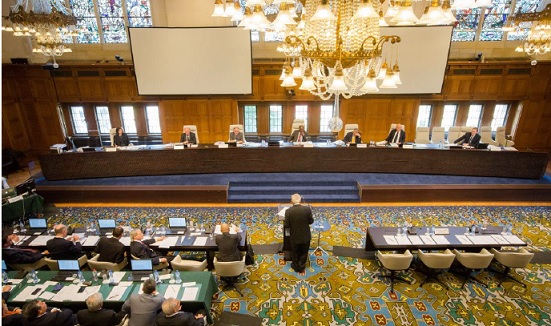
Vietnam welcomes the Award
Vietnam, which also claims portions of Spratlys and submitted a paper with teh U>N. Arbitral Court to support the Philippine case, welcomed the decision.
In a statement, the spokesperson of the Ministry of Foreign Affairs of Viet Nam, Le Hai Binh said, “Viet Nam reaffirms its consistent position regarding this arbitration as fully reflected in the Statement of the Ministry of Foreign Affairs of Viet Nam transmitted to the Tribunal on 05 December 2014.
“Accordingly, Viet Nam strongly supports the settlement of disputes in the East Sea by peaceful means, including legal and diplomatic processes, refraining from the use or threat of use of force in accordance with international law, including the 1982 United Nations Convention on the Law of the Sea, maintenance of regional peace and stability, security, safety and freedoms of navigation and over-flight in the East Sea, and respect for the rule of law in the oceans and seas.”
Former Solgens’ statement
Associate Justice Francis H. Jardeleza, who was the Solicitor General when the case was filed in January 2013, and former Solicitor General Florin Hilbay, who argued the case at the Arbitral Tribunal in The Hague, issued a joint statement saying the decision is “binding on China.”
“It has been the consistent view of the legal team that this Award will be a potent legal platform as our country moves forward o the political and diplomatic phase of our goal of effectively asserting our maritime entitlements under UNCLOS,” Jardeleza and Hilbay said.
They further said, “With this legal advantage, the Chief Diplomat and Architect of our foreign policy, President Rodrigo R. Duterte, can now proceed with the necessary tools at his disposal to get the job done.”
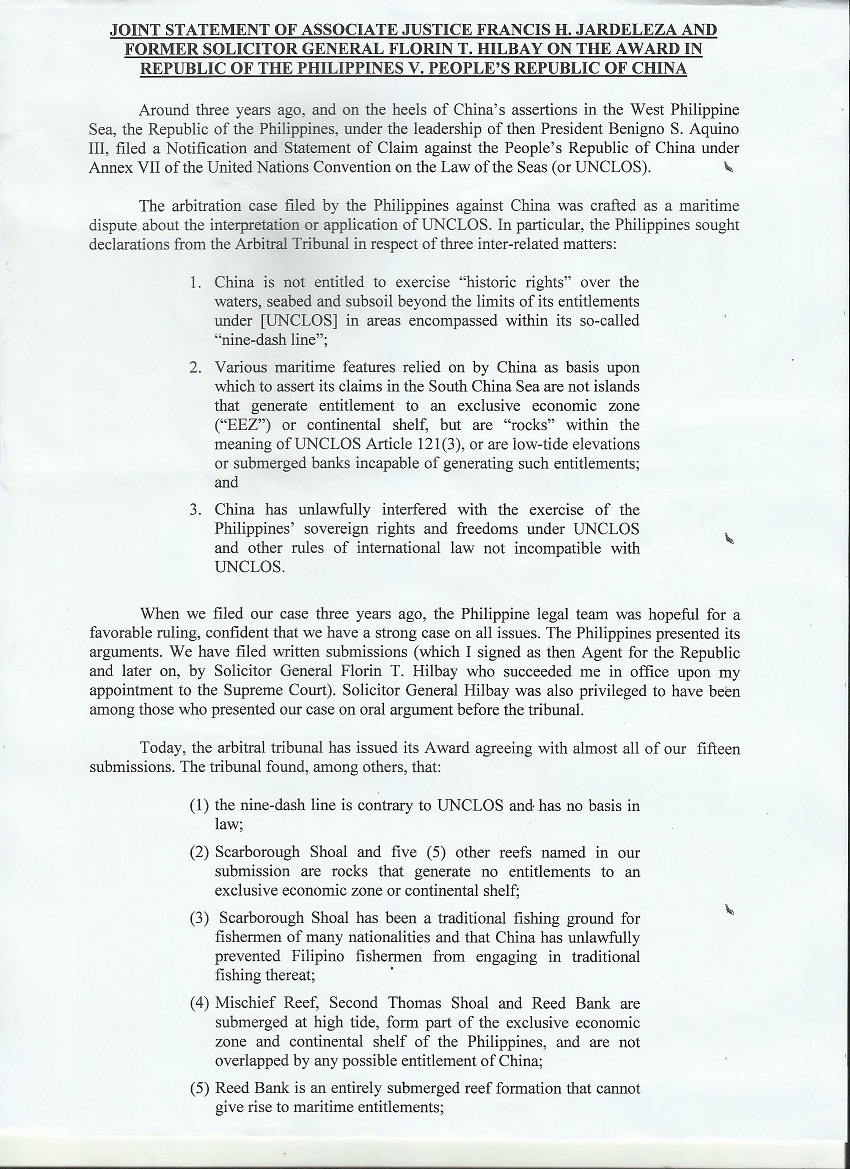
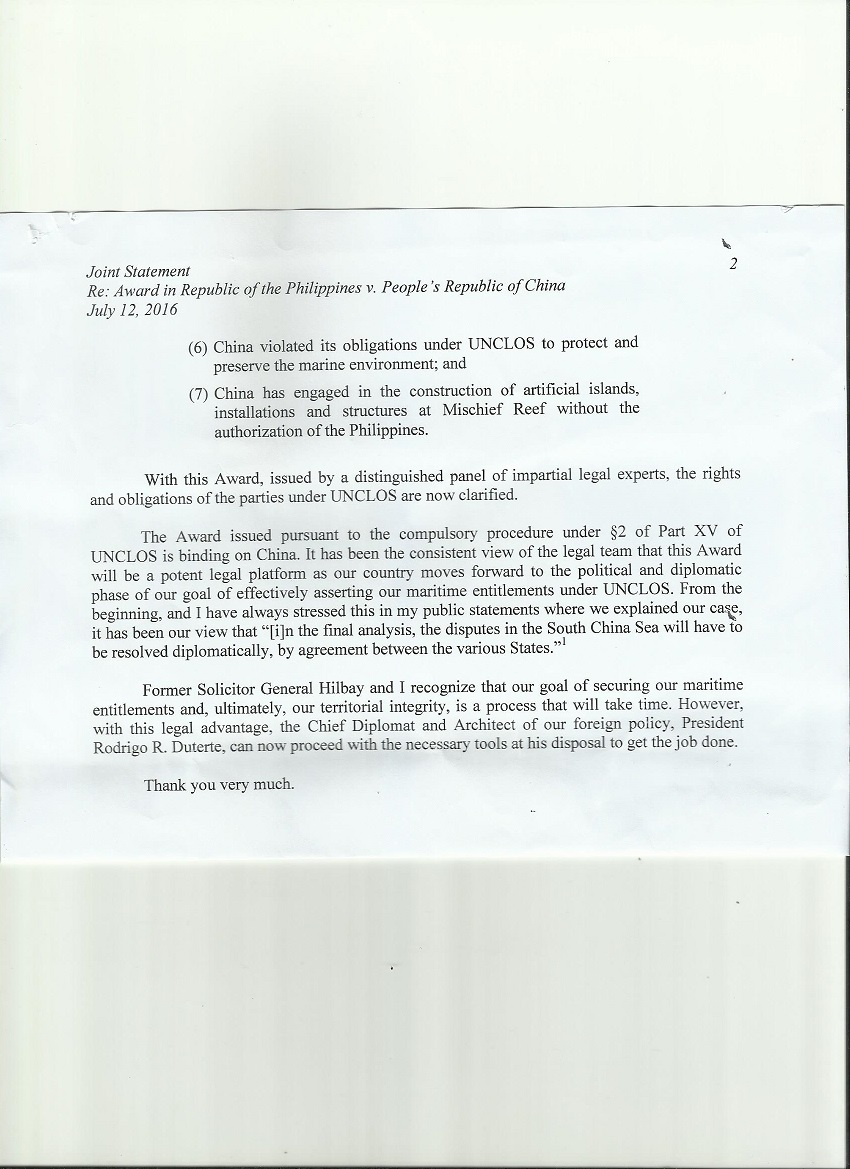
Former President Aquino and his foreign secretary
Former President Aquino III, whose government initiated the suit, said, “International law has been made clearer with this monumental decision. This of course deals with the Philippines and China, clarifying each state’s rights and obligations; but as our lead counsel said, it also has very strong implications as far as other coastal states are concerned, with regard to UNCLOS.
“At this point, may I suggest that instead of viewing this decision as a victory of one party over another, the best way to look at this judgment is that it is a victory for all. I say this because the clarity rendered now establishes better conditions that enable countries to engage each other, bearing in mind their duties and rights within a context that espouses equality and amity.”
Former Foreign Secretary Albert del Rosario said, “The Awards affirms the primacy of the rule of law based on UNCLOS, the constitution for the oceans. The Award further affirms our collective belief that right is might and that international law is the great equalizer among states.
” For the sake of maintaining international order, it is imperative that the Award and clarification of maritime entitlements be accepted by all relevant countries – without exception – so that we can work together on how remaining issues can be peacefully resolved.”
Justice Carpio’s statement
Senior Associate Justice Antonio T. Carpio, the moving force behind the Philippine suit, said, “The Tribunal’s ruling today re-affirms mankind’s faith in the rule of law in peacefully resolving disputes between States and in rejecting the use or threat of force in resolving such disputes. This rule of law is enshrined in the United Nations Charter.
“The ruling also re-affirms UNCLOS as the Constitution for the oceans of our planet, a treaty ratified by 167 States, including China and the Philippines. The ruling applies the fundamental law of the sea principle that ‘land dominates the sea,’ that is, any claim to maritime zones must emanate from land and can extend only to the limits prescribed under UNCLOS. No state can claim almost an entire sea contrary to this fundamental principle and maritime limits.
“The ruling further re-affirms the wisdom of the Philippine Constitution in renouncing war as an instrument of national policy, and in adopting international law as part of the laws of Philippines. The ruling manifests the faithful compliance by the Philippine Government to the Philippine Constitution, which mandates that the “State shall protect the nation’s marine wealth in its xxx exclusive economic zone, and reserve its use and enjoyment exclusively to Filipino citizens.”
Harry Roque’s statement
Rep. Harry Roque, an expert in international law, said the ruling of the Permanent Court of Arbitration is a very big win for the Philippines.
Roque further said: “I believe the Court applied letter and spirit of the United Nations Convention on the Law of the Sea (UNCLOS) in its decision. Since the Juridical Regime of Historic Waters is not among the maritime zones under the UNCLOS, China cannot invoke the nine-dash-line claim as a valid legal basis for its maritime expansion in the West Philippine Sea.
“Nonetheless, the ruling does not settle the entirety of the dispute as it involves claims to islands, which is beyond the jurisdiction of the International Tribunal for the Law of the Sea (ITLOS).
“We should return to the negotiating table with China, take advantage of the ruling of the Court, and settle once and for all the issue of conflicting claims within the Spratly Islands.
“The decision of the Permanent Court of Arbitration itself will facilitate an early settlement of the issue because none of the islands can generate an Exclusive Economic Zone of 200 nautical miles, which will make the process of negotiation a lot easier.”
Senators welcome the Award
Sen. Antonio Trillanes III, who backchannelled between the Philippines and China to break the two-month stand off in Scarborough Shoal in 2012, said, “The landmark decision of the Arbitral Tribunal is a historic victory for our Country. Equally important is that, based on early reports, it is definitive, categorical and expectedly upheld the provisions of UNCLOS which could help the Duterte Administration in pursuing the next course of action. Lastly, the favorable decision is a vindication of the foreign policy direction of the Aquino Administration.”
Sen. Loren Legarda, an environment protection champion, congratulated the Philippine legal team for preparing a very well researched case with the International Tribunal of the PCA. ”
“I welcome the impartial, authoritative decisions rendered by the Tribunal and can only hope that these will serve as guideposts for the parties in this dispute,” she said
However, Legarda raised concerns over the destruction of the marine environment in the contested waters and hoped that such activities harmful to the marine ecosystems will be stopped immediately.
“Our interest in protecting the marine environment stems not only from territorial concerns but also from our collective responsibility to conserve and ensure the sustainable use of our marine resources,” the lady senator said.
Former Sen. Ferdinand Marcos, Jr. said “The ruling upholds the Philippine position that all maritime areas claimed by the Philippines are rightfully within our economic zones and territories. This will hopefully clarify the points that we can start our talks with China. Let us take this opportunity to begin to resolve our conflicting positions with China.”
The former senator’s father, President Ferdinand Marcos, initiated the establishment of diplomatic relations with China in June 1975.
European Union statement
The European Union and its Member States said they acknowledge the Award rendered by the Arbitral Tribunal as they stressed that “The EU does not take a position on sovereignty aspects relating to claims.”
In a statement, the EU expressed “expressed the need for the parties to the dispute to resolve it through peaceful means, to clarify their claims and pursue them in respect and in accordance with international law, including the work in the framework of UNCLOS. “
Arbitral court invalidates China’s 9-dash line
